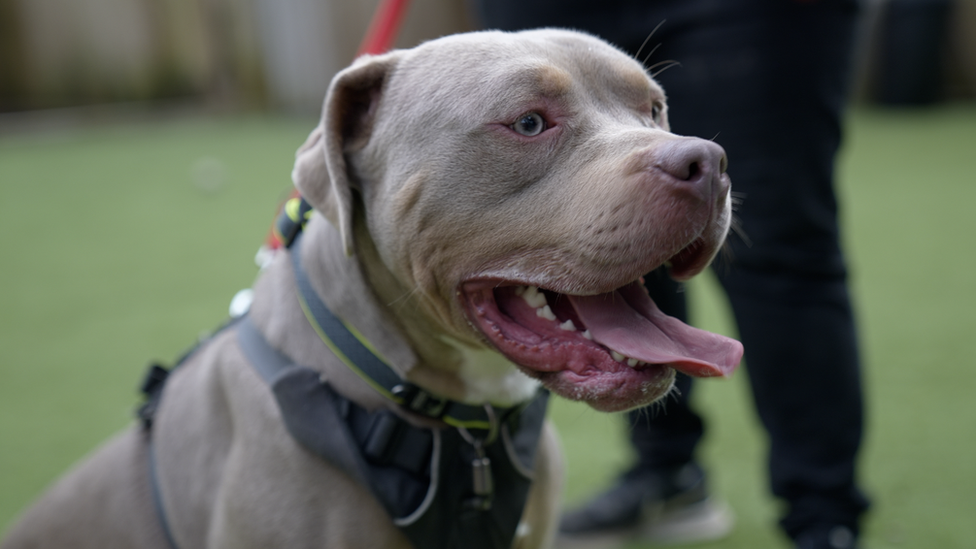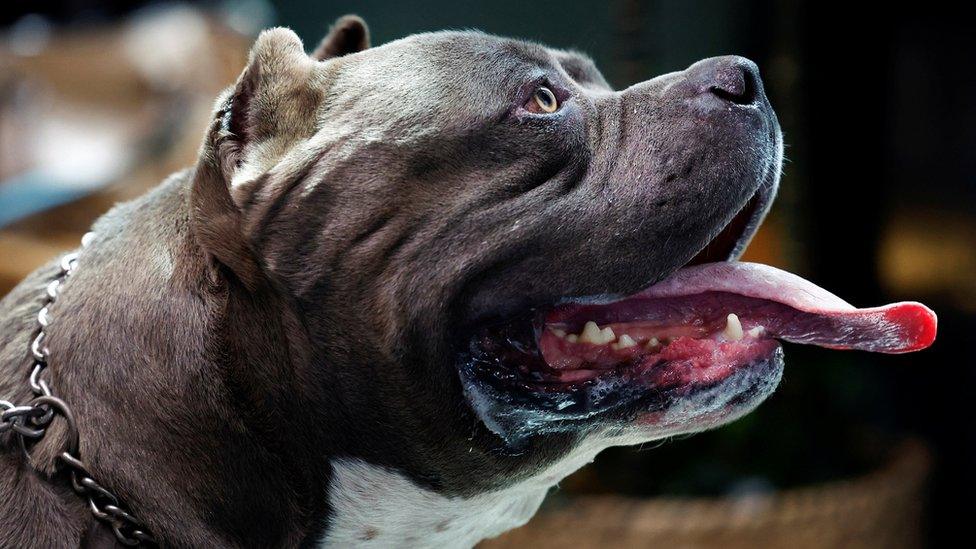Healthy dogs may be put down after American bully XL ban, dog charity warns
- Published
People are worried about losing their homes due to the American bully XL ban
The ban on American bully XL dogs could lead to a rise in the number of healthy dogs being put down, a charity has warned.
Earlier this month, Prime Minister Rishi Sunak announced that the American bully XL dog will be banned, following a spate of recent attacks.
Hope Rescue, which runs a dog shelter in south Wales, says they will face having to put to sleep perfectly happy, healthy dogs because it could be illegal to re-home a banned breed.
And while many have welcomed the ban, some animal charities are worried about the effects it may have at a time of already high demand on their services.
Rob Mitchell, CEO of the National Animal Welfare Trust (NAWT), says a "perfect storm" of pressures are creating a difficult time for animal rescue and re-homing charities.
NAWT operates five rehoming centres in England. They have seen an increase in their energy bills, vet fees and staffing costs at the same time as financial pressure on their supporters has made fundraising more difficult.

XL bullys have an uncertain future
Mr Mitchell says all of his centres are operating waiting lists due to an increase in demand from owners seeking to give up their pet to the charity.
"We are actually dealing with less animals because they are coming in with more complex health and behavioural problems which take up more of the staff's time and mean that they are with us longer than we have seen historically," he told the BBC.
Like many other charities, since the American bully XL ban was announced NAWT report an increase in phone calls from owners who are concerned about what the future may hold for their dogs.
Mr Mitchell says it will be "very difficult" to re-home American bully XLs if they are on the banned list as people will be reluctant to take on the additional work and will be wary of all dogs from this breed being aggressive.
Under a ban, there will not be a cull of American bully XLs, but the government will instead adopt an "amnesty" approach, whereby owners will have to register their dogs. The dogs will also need to be neutered, muzzled when out in public and on a lead and insured.
With many dog owners looking for more information on how the ban will affect them, some people have set up training events to help.
Veterinary nurse, Fay Alsworth, says there has been "fear and confusion" from dog owners since the ban was announced.
She has organised an event, external which will bring together a group of professionals, including police dog handlers, dog legislation officers and canine behaviourists. Also present will be the owner of a currently banned breed to explain how this impacts their life and their dogs.
Dog trainer Maddie Bell-Ashe describes the impact of the American bully XL ban
Maddie Bell-Ashe, a trainer from TLC Dog Academy and Walking, near Milton Keynes, runs muzzle training classes and has shared information online on what the ban may mean for owners.
"I've been getting enquiries from Glasgow to Devon with people asking for help," she says. "People are getting really overwhelmed.
"A bit more education, more support, more people invested in helping the dogs could help."
She says that "nobody knows" if their dog will fall under the ban until the breed definition is announced by the government.
Sara Rosser, Operations Manager at Hope Rescue, thinks "people may panic" if their dog unexpectedly falls under the American bully XL ban and that this will lead to dogs being abandoned.
"Many rescues are already full," she says. "We're already working at over capacity. We're having to hire private boarding kennels as well as [use] our own rescue centre kennels and our foster homes."
She thinks that a rise in abandoned dogs would put the whole system under strain and lead to difficult decisions.
"Will we still be able to help stray dogs? Are we going to end up in a situation where actually we're having to euthanise more dogs because they can't be re-homed?"
Mrs Rosser adds that this outcome could lead to further issues for rescue centres in retaining staff.
"If you're a dog-lover, are you going to want to work in an environment where you may have to put to sleep happy, healthy dogs? No."
Related topics
- Published24 March

- Published21 September 2023

- Published1 November 2023
